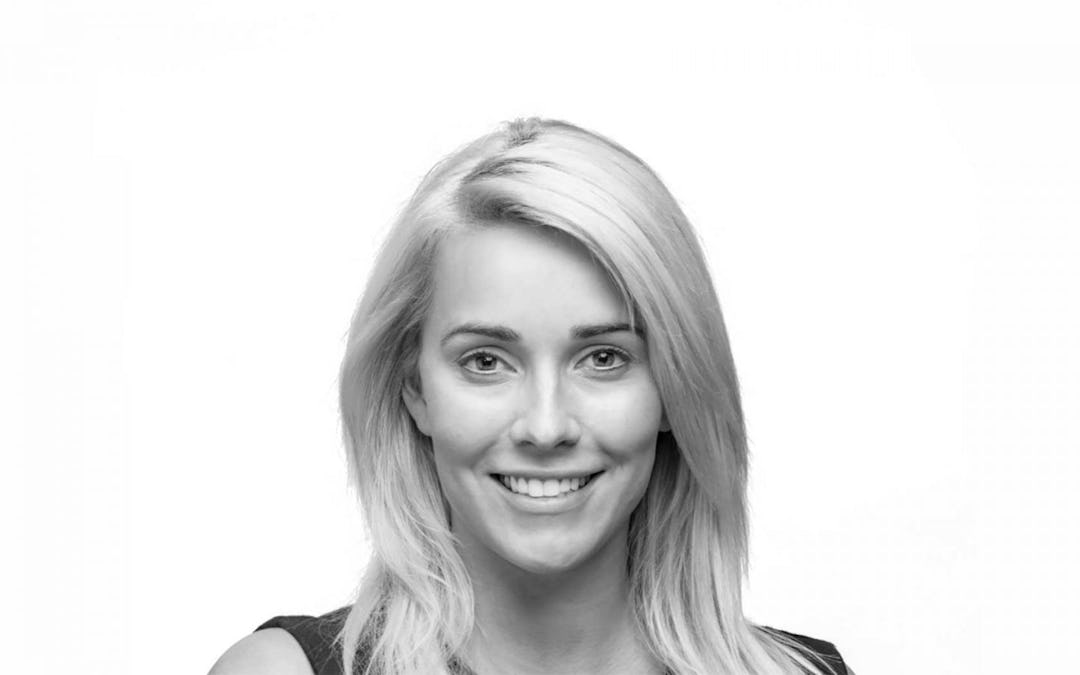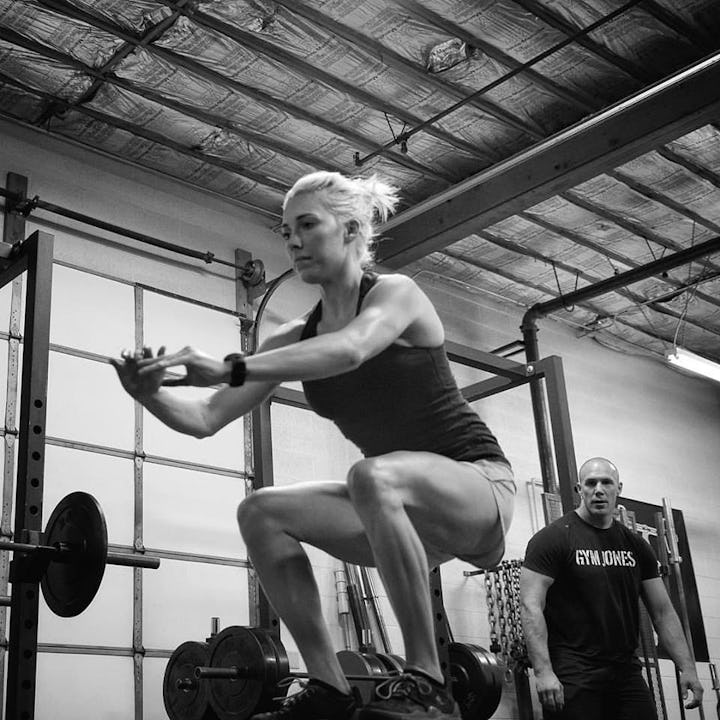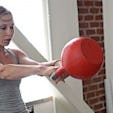Gym Jones is a private training facility in Salt Lake City, named in reference to a lunatic cult leader who drove his followers to suicide, and most famous for training the cast of the movie 300. To many, it sounds like no place for a lady.
But Lisa MacDonad, GJ’s Director of Women’s Fitness, begs to differ. Wife of Rob “Maximus” MacDonald, former UFC fighter turned Gym Jones’ General Manager, Lisa says women can do any kind of training men can—no matter how Spartan—as long as they recognize that they have to do it a little differently. In an effort to evangelize women seeking serious fitness, Lisa created the Women’s Specific seminar, which covers training and nutrition strategies specifically for the fairer sex.
Before Lisa brings the seminar to Onnit headquarters this weekend (space is still available; see below), she talked with us about why being “one of the boys” in her gym didn’t work, how to train through pregnancy and come back afterward, and why science doesn’t know the first thing about women.
Gym Jones For Women: An Interview With Lisa “Maximus” MacDonald
Onnit: How did you first get interested in fitness?
Lisa MacDonald: I was a competitive horseback rider growing up. I loved doing it but it’s very expensive, and when it became time to retire from riding, I had a really hard time filling that void. For me, nothing really replaced it besides lifting weights. I was 24.
I went to a globo gym and worked out with a trainer there. Then I ended up going with a bunch of girlfriends to the quote “most hardcore gym in Michigan.” It was a kettlebell gym—the kind of place where the instructor screams at you and they run it like the military. I worked out with them and I loved it! And I was kind of good at it. So I started going there every day, even doing two-a-days. I thought I was pretty fit.
I got the kettlebell thing down, got a few certifications, and they ended up offering me a job there. The company expanded and opened up a second gym, and I started running it. I got to work with athletes, older people, young people, and I loved it.
Stumbled upon some kettlebells! Sometimes I forget how much fun I have with them. I am not a believer in only using one tool nor do I think one is superior to another. They each have a purpose and strength and weakness. But today have a little fun with a clean and press! Doing 5 sets of 5 with strict form always gets my shoulders and abs! #workoutwednesday #kettlebells #fitness #loveit #momswholift #strongwomen #gymjoneswomen #alpha
Two-a-days sounds intense. Were you able to recover from all that?
Well that’s the thing¦ I was eating a low-carb, Paleo diet, and I felt like crap. All the men were saying, “I feel like I can run through a brick wall!” Meanwhile, I was waking up drenched in sweat with heart palpitations. I had vertigo; I couldn’t breathe. My body fat got down to 13%. I was 116 pounds. Ultimately, I didn’t have a period for seven years. That’s when I got involved with Gym Jones.
Is that how you met your husband, Rob MacDonald, who’s now their GM?
Yes. Through the gym I was working at, I started meeting people from Gym Jones, and Rob and I met at one of their seminars in Utah. I was strong for my size but what I was doing was nothing compared to what these people at Gym Jones were doing. Their rowing numbers, Airdyne sprints¦ the women were doing 100 back squats unbroken with 95 pounds. Holy jeez! It was next level. I felt like I knew nothing. That was attractive to me because anything extreme, anything I can’t do, I’m drawn to. If I’m not good at something, I want to do it until I am.
Is it true that Rob got you fired from your gym?
Yes! When we first started dating, he came to my gym to visit. He stood in the doorway and crossed his arms and he said, “What is this, a dog and pony show? This is ridiculous.” He comes from a professional fighting background and was training pro athletes—my gym was all people wearing matching Lululemon. He said, “This isn’t a place of hard work.” Most women there couldn’t deadlift 135 pounds, and when you’re surrounded by that, you think if you can deadlift 200 you’re the strongest person on earth. But you need to set your sites higher.
He said, “You’re above all this. I want you to come to a Gym Jones seminar next weekend.” I said, “I can’t. I could get fired.” He said, “I don’t give a shit,” and he booked my flight. He said, “You should move to Utah, and I’m going to marry you.”
I told my bosses I wanted to go to the seminar and they said I was costing them money—“if you want to go, leave your key.” So I left my key.
But I fell in love with the whole Gym Jones community right away. I got there in 2014.
That’s one of the most romantic stories in the fitness industry! But let’s go back to your health problems. How did you start healing yourself?
So I got to Gym Jones and I saw women eating! I started working with my husband and he said I wasn’t eating enough. I couldn’t get a period because I was too thin. Of all the doctors I had seen, no one ever asked me about my diet. They said, “We can start you on birth control and make you have one,” and I said, “Let me have it naturally by figuring out what’s wrong with my system.”
I started finding all these things out, like women don’t do well with low carbs. In a fight or flight state, we react differently than men. When a man’s body senses famine because he’s not eating enough food, his body tells him to spread his seed—produce more testosterone, and that makes men feel better. When a woman feels like there’s famine, her body says, “We can’t sustain pregnancy; we can’t breastfeed. Shut down your hormones and gain weight.” We’re not worse than men and we’re not victims. We’re just different. We have a different hormone profile. But that would have been nice to know when I was having heart palpitations! Instead, I was thinking, “I have to be tougher.”
So the first thing I did was relax about it. Before, I had been so Paleo that I followed every rule—if it wasn’t organic, didn’t come from the earth, or have a mother and father, I didn’t eat it. Just relaxing and not counting calories was a big change for me. I ate more carbs—oatmeal and potatoes. Then I started eating things like burgers and French fries, which I don’t preach for everybody, but just getting some of those calories in even though they weren’t super healthy made me feel great. Most women eat a low-protein diet—not a lot of meat—so they’re low in iron.
Pretty quickly, my body started to change. I got my period back and I got pregnant. I have a gorgeous little dude now, and my numbers in the gym are through the roof.
That’s awesome. Most women—and men—have trouble taking fitness advice from a significant other. Why were you able to?
[Laughs] My husband and I get into it a lot about training and food because we’re both so stubborn and opinionated and competitive. He pushes and I push back! But he’s one of the best trainers in the country and he’s been doing this a lot longer than me. He’ll say, “Trust me. I know what I’m talking about.” So if it works, how do you argue that? And he’s doing it with me, leading by example.He’ll also say things like, “Why would I want to hurt your success? No one wants to see you succeed more than me.” He actually wants me to be 10 pounds heavier! That helps. If I put on weight he’s not going to say, “Come on. You’re letting yourself go.” Right now I’m striving for a 300-pound deadlift, and he says I can get 360 if I’m 10 pounds heavier. I weigh 140 now. Two years ago I never would have let myself get that heavy, because I’m 5’4” and I thought I should be 120. But I look and feel better at this weight.
Many women have been similarly misled by flawed nutrition advice. What do you say to them?
Science doesn’t study women. Look at the research out there and 95% of it is done on men with regard to things like the Paleo Diet. This is because women are too complicated to study. You have to take into account their hormones—they’re so often on birth control, just had a baby, or want to have a baby. It’s much easier to just study men.
As a woman, you might get a flood of hormones and then a minute later they’re gone. That’s why women get emotional moments on their periods—because hormones suddenly flood you and then go away. Science is just starting to study women and understand the differences but it’s still frustrating, so that’s why it’s great to bring a community of women together to talk about these things. We learn from each other.
You mean with the Women’s Specific seminar that you run at Gym Jones?
Yes. When I came over, there were three female instructors. Now I think we’re at 15, and they gave me the platform to help women. Gym Jones does appeal to a more male-dominated, extreme audience, because it’s about really working hard, putting your head down, and going into dark places, but we have so much education as well.
My baby became the Women’s-Specific seminar. People confuse that as “women only,” but that was not my goal. Men can come too. I wanted a seminar where we would discuss what it’s like being a woman in the gym and what our needs are. The four pillars of the seminar are biology, psychology, nutrition—including eating disorders—and pre- and post-natal fitness.
How should a woman’s body be trained differently than a man’s?
We have different muscle fiber distributions. Women have more type I fibers in the upper body than men do. That makes our training a little different because we don’t have as much explosiveness in the upper body. So if I’m running a workout where men and women are doing pullups, if I want them to finish around the same time, I give the guys 100 total reps and the women do 50. Same thing with pushups.
With the lower body, women can do the same number of reps as men at a given percentage of their 1RM [one-rep max], since we have a similar distribution of type I and type II muscle fibers there. We’re very equal in the lower body, pound for pound of lean mass.
How should women train during their cycle?
There are two phases in the menstrual cycle. The follicular phase, which happens first, and the luteal phase, which is the second half. The first half is measured from when you start your period and that first 14 days. During the follicular phase, your hormones are a little more steady. So you’re stronger during that time of the month, which makes it a good time to do more strength and power work.
During the luteal phase, your hormones start to fluctuate. You ovulate. The shift in hormones can cause fatigue, make us more insulin resistant, and make us crave more carbs. That’s when they say you should go for more slow-paced, endurance, fat-burning workouts.
Now if you’re training for the Olympics, the Olympics doesn’t give a shit when your period is. I’ve set PRs during my luteal phase and so have other women, so it’s not the end of the world. But before you start your period, relaxin hormone is released in your body, which helps relax your muscles and tendons. This increases your risk of injury. That’s why if a girl blows out her ACL or breaks a bone they’ll ask her if she’s on her period.
When you shed the lining of your uterus, there are hormones telling your body to do that. Unfortunately, they don’t just go to the lining of your uterus, they go to your intestinal tract and other parts as well. It causes a lot of women to get diarrhea, so they get a little dehydrated, and that depletes iron levels. It’s like having a stomach flu.
If it gets that bad, there’s no need to push through it. Take a day or two off from the gym until it passes.
Is there anything women can do to prevent symptoms of their period?
Keeping iron levels up helps, but get your blood work done to see if it’s low first. If you know you’re going to have low iron, you can take an iron supplement, eat more red meat, or have some cacao in your shake. Cacao is high in iron, which is why women crave chocolate.
Do you have any tips for staying fit during pregnancy?
The first thing is get cleared by a doctor to make sure you’re not a high-risk pregnancy. In your first trimester, you want to be careful that you don’t get overheated, because that causes neural tube defects in infants, and you can permanently damage your baby that way. So don’t go out in the heat. Don’t go for a long run outside in Arizona or Texas.
There are some old-school thoughts that you’re not supposed to lift anything over 20 pounds and your heart rate isn’t supposed to go over 130 beats per minute, but a lot of doctors today have shifted away from that. They’ve found that women can still lift up to 80% of their 1RMs. But don’t do anything where you use the valsalva maneuver, pushing down on the pelvic floor to create intra-abdominal pressure. That’s bad when you’re pregnant. Instead, this is a good time to work on structural stuff like one-legged deadlifts or one-legged squats to a box. These things can help you come back post pregnancy if you do them now.
As for cardio, as long as you can talk—I mean have a full conversation—when you’re doing it you know your body is not in distress. There aren’t really studies on this stuff and there never will be because it’s unethical. No one’s going to participate in a study that pushes your body to have a miscarriage. But we do know that when mom’s heart rate is too high it sends the baby into bradycardia, so its heart rate actually starts to slow down. What happens when that happens for too long? We don’t know, thank God, because it hasn’t been studied. But it’s really dangerous. So training during pregnancy is about just maintaining and feeling good.
Be patient. When I came back, I got really into cardio again because I wanted to get my conditioning back, but when you do really intense cardio, it will decrease your milk supply. You need to drink a ton more water and eat more calories. If your body senses it’s depleted, it won’t make food for your baby.
You also have to be concerned about your abs separating and splitting open, so you have to be careful about what kind of ab exercises you do. There are some exercises that make it worse. Avoid any position where your abs are pushed outwards. You want to do things where you pull the abs back and upwards. You’re not sucking in; you’re trying to draw your belly button in to your spinal cord. The best exercise is to lie down flat on your back, tuck your chin to your chest, and raise your head and the top of your shoulders, like a mini crunch.
To a lot of people who haven’t experienced it, how would you describe the difference between what you do at Gym Jones and what you see in the typical CrossFit box?
Our workouts aren’t as much for time. The majority of the work that we do is weight lifting and then breathing [cardio]. Instead of having you breathless when you’re deadlifting, we’ll have you deadlift at the beginning and then have you row or ski erg later. We’re really goal-focused. There’s a little more programming than you see in CrossFit, and it’s more individualized. You don’t come in and do a WOD. It’s more like “this person is coming in to train to go to the Olympics for Taekwondo,” or “that person is training for a marathon.” They work out together in groups and we come together for the breathing stuff, but you need to do what you need to do for your program.
We really try to stay away from what we call “junk intensity,” where the person works harder than they need to and just beats themself down.
There are a lot of people sweating it out in garage gyms who would love to build the kind of empire Gym Jones has now. What’s your advice to them?
Protect your environment. We keep negative people out. The kind of person who rolls their eyes and says “this is hard.” We don’ let people writhe around on the ground. When you see people in the Olympics who just won a gold medal, they’re not lying down and rolling around. They’re waving to the stands or blowing kisses to their kids or high-fiving their teammates. For us it’s mind over matter. If you tell yourself you’re going to be OK, you’re going to be OK.
We have a no-bullshit, love-it-or-leave-it attitude, so it’s kind of funny when people come in and say, “You guys are a lot nicer than I thought you’d be.” We like to work hard and support each other and we have a really positive community. Our people will tell you we feel like a family. We’re bettering each other not only in the gym but in every aspect of life. We have people in there who learn how to be a better husband, wife, father, mother. We’ve had people come in and lose over 100 pounds. If you have that in the gym, you’ll attract more of that, but if one person quits, everyone else starts quitting too.
Our brand intimidates people, but we want to change that image. It’s not about how much you lift or how much you row. It’s about how hard you try.
Sign up now for Lisa MacDonald’s Women’s Specific Seminar at the Onnit Academy in Austin, TX, this weekend—August 5th and 6th. This event is 50% off the regular seminar price. Go to gymjones.com/seminars/7.
Follow Lisa on Instagram at @lisamaximus.


)






